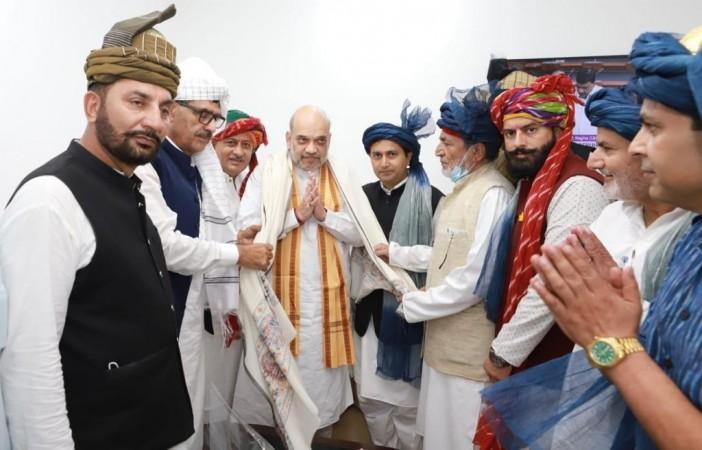
With the announcement of the much-awaited Assembly elections in the Union Territory of Jammu and Kashmir, a fresh controversy has erupted as Gujjars and Bakerwals, who have been granted Scheduled Tribe (ST) status in 1990. They have voiced strong opposition to any attempts by the ethnic Pahari tribe to claim the nine constituencies reserved for STs.
The ethnic Pahari tribe and three other communities were granted ST in February this year.
"Those communities who were granted ST status before 2024 are eligible to fight elections on the seats reserved for STs," argued Anwar Choudhary, convenor of the All J&K Gujjar Bakerwal Coordination Committee.
"How can the ethnic Pahari tribe or other groups, who were granted Scheduled Tribe status after the delimitation commission submitted its report, stake a claim on the Assembly seats reserved for STs?" questioned Anwar Choudhary while talking to International Business Times.
Choudhary highlighted that the delimitation commission recommended the reservation of nine seats for STs based on the 2011 census report. He pointed out that the census for the ethnic Pahari and other recently included groups has not yet been conducted, implying that these groups are not eligible to contest elections for the Assembly seats reserved for STs.
The Gujjars and Bakerwals firmly believe that only tribes granted ST status in 1991 are eligible to contest these reserved seats. Choudhary emphasized that only ST groups classified as ST-I are permitted to run for the reserved ST seats in the upcoming Jammu and Kashmir Assembly elections.

Anwar also referenced the Jammu and Kashmir Reorganisation Act, 2019, which was passed by the Indian Parliament in August 2019. This Act bifurcated the state into the Union Territories of Jammu and Kashmir, and Ladakh, and extended national laws to the region.
Following the Act, a Delimitation Commission, chaired by retired Justice Ranjana Prakash Desai, was established in March 2020. The Commission's final report, which came into effect on May 20, 2022, reserved nine seats for ST communities that were declared STs in 1989 and 1991. The report also added six more seats to the Jammu and Kashmir Assembly, bringing the total to 90 seats.
Choudhary stated that the Commission's report was based on the ST population as per the 2011 census conducted by the Registrar General of India in Jammu and Kashmir.
The nine Assembly seats reserved for STs include:
- Surankote
- Mendhar
- Budhal
- Thanamandi
- Rajouri
- Gulabgarh
- Kangan
- Kokarnag
- Gurez
Four more communities granted ST status this year
In February of this year, a historic bill was passed in the Lok Sabha, granting ST status to J&K's Pahari Ethnic Group, making Paharis the first linguistic group in the country to receive Scheduled Tribe status. With the inclusion of four more communities, there are now 16 tribes in the ST list of J&K.
Old List of STs in J&K
1. Balti
2. Beda
3. Bot, Boto
4. Brokpa, Drokpa, Dard, Shin
5. Changpa
6. Garra
7. Mon
8. Purigpa
9. Gujjar
10. Bakarwal
11. Gaddi
12. Sippi
New List of STs in J&K
1. Bakarwal
2. Balti
3. Beda
4. Bot, Boto
5. Brokpa, Drokpa, Dard, Shin
6. Changpa
7. Gadda Brahmin
8. Gaddi
9. Garra
10. Gujjar
11. Koli
12. Mon
13. Paddari Tribe
14. Pahari Ethnic Group
15. Purigpa
16. Sippi.
On February 6, the Lok Sabha passed the "Constitution (Jammu and Kashmir) Scheduled Tribes Order (Amendment) Bill, 2023," which included the "Pahari ethnic group," "Paddari Tribe," "Koli," and "Gadda Brahman" communities in the Scheduled Tribe List of Jammu and Kashmir.
Choudhary clarified that under the new provisions, individuals classified under ST-II are not eligible to apply for the reserved Assembly seats allocated to ST-I, and vice versa.














